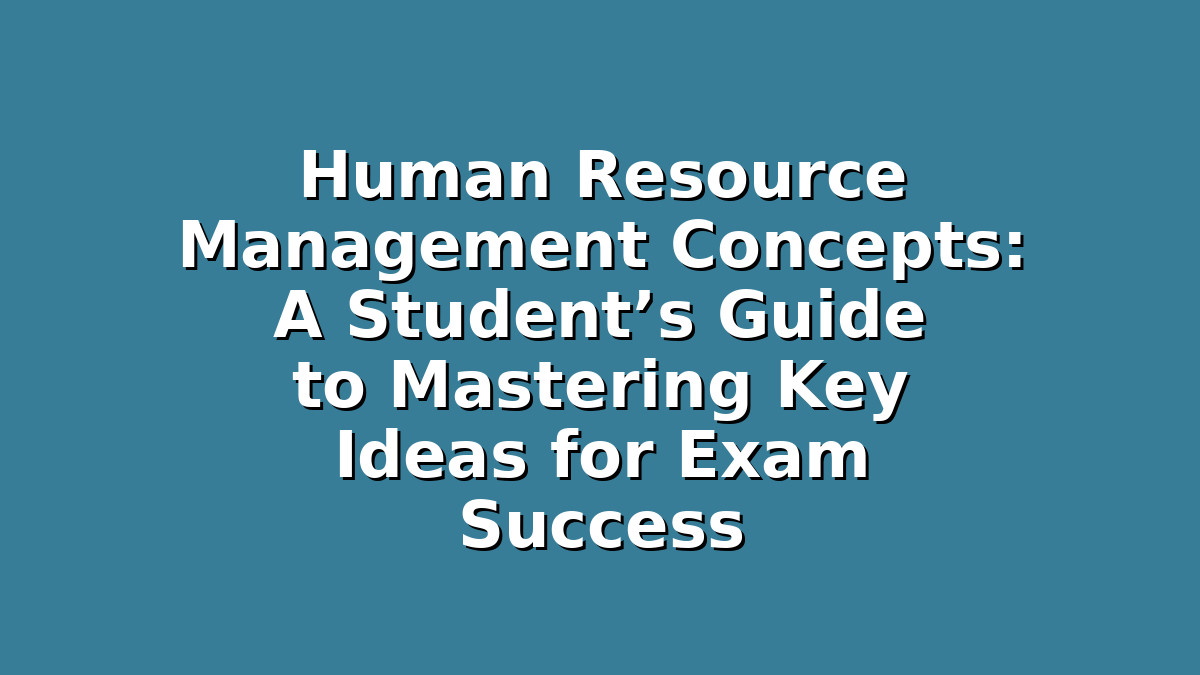Preparing for exams in Human Resource Management (HRM) can feel overwhelming, especially when you encounter a wide array of concepts, theories, and practical applications. Whether you’re a business student, preparing for professional HR certifications, or just aiming to score well in your HRM course, understanding the fundamental concepts is essential. This guide will help you break down key HRM ideas and provide practical study tips so you can approach your exams with confidence.
Introduction: Why Understanding HRM Concepts Matters
Human Resource Management is a critical function in any organization. It involves recruiting, managing, and developing people to optimize their performance and help achieve organizational goals. Unlike purely theoretical subjects, HRM blends theory with practical scenarios, making it vital to not just memorize definitions, but also grasp how concepts apply in real-life workplaces.
For students, mastering HRM concepts means more than passing exams — it’s about building a solid foundation for future careers. To help you succeed, this article will explore three essential HRM topics with focused study tips: Recruitment & Selection, Training & Development, and Performance Management.
—
1. Recruitment & Selection: Understanding the Talent Acquisition Process
Recruitment and selection are among the most foundational HRM functions. They involve attracting qualified candidates and choosing the right person for the job. Here’s what students should focus on:
– Key Concepts to Know: Job analysis, job description, sourcing methods (internal vs external), selection techniques (interviews, tests, assessment centers), and onboarding.
– Why It Matters: Hiring the right employees reduces turnover and increases organizational efficiency.
– Study Tips:
– Create Flowcharts: Visualize the recruitment process step-by-step—from identifying vacancies to making job offers. Flowcharts help remember the sequence and purpose of each stage.
– Use Real-Life Examples: Think about companies you admire and how they might recruit talent. This contextual understanding makes concepts stick.
– Practice Case Studies: Many HR exams include scenarios where you must identify the best recruitment method or solve a selection dilemma. Practice with sample cases to improve problem-solving skills.
Remember, recruitment isn’t just about filling vacancies; it’s about aligning talent with organizational culture and goals. Keep this broader perspective in mind when studying.
—
2. Training & Development: Enhancing Employee Skills and Growth
Training and development focus on improving employees’ capabilities to meet current and future job requirements. This topic often includes concepts like needs assessment, training design, delivery methods, and evaluation.
– Key Concepts to Know: Types of training (on-the-job, off-the-job), learning theories (behaviorism, experiential learning), succession planning, and career development.
– Why It Matters: Continuous learning drives innovation and keeps organizations competitive.
– Study Tips:
– Summarize Theories with Mnemonics: Create memory aids to recall different learning theories and their characteristics. For instance, “B-E-L” for Behaviorism, Experiential Learning.
– Compare and Contrast: Make tables that highlight differences between training methods or between training and development.
– Apply to Personal Experience: Reflect on a time you learned a new skill—how did that training help you? Relating theory to personal experience deepens understanding.
When you study training and development, think beyond exams. These concepts are key to how organizations nurture talent and prepare for the future.
—
3. Performance Management: Measuring and Improving Employee Outcomes
Performance management is about setting expectations, monitoring results, and providing feedback to enhance employee productivity. It includes goal-setting, appraisals, coaching, and reward systems.
– Key Concepts to Know: SMART goals, performance appraisal methods (360-degree feedback, rating scales), performance improvement plans, and linkages with compensation.
– Why It Matters: Effective performance management motivates employees and aligns their work with organizational objectives.
– Study Tips:
– Practice Writing SMART Goals: Get comfortable drafting Specific, Measurable, Achievable, Relevant, and Time-bound objectives for different roles.
– Role-Play Feedback Sessions: Practicing how to give constructive feedback can help you understand the nuances of appraisal methods.
– Use Diagrams: Visual aids illustrating the performance management cycle enhance retention.
Keep in mind that performance management is dynamic. It’s not only about judging past performance but also about fostering growth and addressing issues proactively.
—
Conclusion: Your Path to HRM Exam Success
Mastering Human Resource Management concepts is a rewarding endeavor that opens doors to many career opportunities. By focusing on Recruitment & Selection, Training & Development, and Performance Management, you cover core functions that shape the employee experience and drive organizational success.
Remember these key study strategies:
– Break down complex processes into simple visual aids.
– Connect theory to everyday examples and personal experiences.
– Practice applying concepts through case studies and exercises.
Stay consistent with your study schedule, remain curious about how HRM impacts real organizations, and don’t hesitate to discuss tricky topics with peers or instructors. With dedication and the right approach, you’ll not only excel in your exams but also gain knowledge that’s valuable throughout your professional life.
Good luck with your studies, future HR professionals!
—

Responses